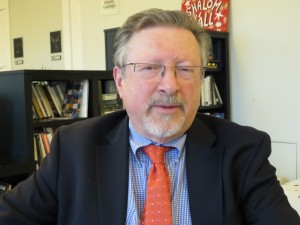Technion medical headhunter speaks at Tulane
By ALAN SMASON
Dr. Paul Alexander is on a cross-country medical headhunt, seeking the brightest of minds headed for medical school to consider applying to the Technion American Medical School program in Israel.

Dr. Paul Alexander visited Tulane University while searching for medical students at Technion School of Medicine. (Photo by Alan Smason)
As part of his mission to find applicants, Alexander was in New Orleans last week to speak to interested students at Tulane University on the possibility of becoming medical doctors through the Technion program.
The opportunity has many perks for those that are accepted.
First of all, there are only 32 students admitted to the school each year. That guarantees an almost unheard-of personal attention few medical schools can deliver. The courses follow the traditional American system of medical training, but have required conversational Hebrew, not typical for other American medical schools and for those that are observant, there are no courses or work required on Shabbat.
Technion differs from other medical schools in other ways, he continued. “From the first week, they start seeing patients with a doctor,” said Alexander, who calls Providence, R.I. his home, but who has made more than 15 trips to Israel and spent a year at Technion as a visiting professor while a member of the faculty of the Brown School of Medicine.
In the typical medical school world, books and theoretical practice hold sway during the first year, so to be paired with a doctor and make rounds seeing patients is also unusual. This happens in the first week students begin school.
Alexander also enjoys telling potential students about the difference in the human anatomy course as taught at Technion School of Medicine. Instead of just dissecting a cadaver, as is the case for all first year medical students, there is a clinical radiologist assigned to work with Technion students. They take MRIs, CATscans and regular x-rays of the body.
“They’re learning how to read x-rays as a freshman, which is amazing,” Dr. Alexander noted. Unless they specialize in radiology most students don’t get exposed to these kinds of scans until later in their careers. “They’ll know more about reading x-rays than students who have graduated from medical school,” he said.
Alexander considers it a better way of teaching. “We’re the only medical school that requires every student to do research. They have a one-0n-one relationship with someone on the faculty,” he explained. Students can report on findings as easy as analyzing data from patients or conduct stem cell research, which he said they can and do.
“More than half of our students have already published a research paper or presented at an international meeting,” Alexander noted.
Despite the requirement for Hebrew, the doctor emphasized that students don’t have to be Jewish. “We have non-Jews who have chocse to come as well and we’re happy to accept them,” he pointed out. Two years ago, an Arab-Israeli woman was class valedictorian.
Alexander used the opportunity for a trip to Texas to swing into Louisiana on his way home. Technion, which he calls “the Israeli M.I.T.,” considers several factors in determining acceptance to its medical school. Grade point average and MCAT scores are important, but so are the required letters of recommendation, he said.
Once they arrive in Israel, they are paired with a mentor, who is an American who emigrated to Israel. The staff has found that this makes a most effective transition for students.
Once their core requirements are completed, seniors may spend time at up to 18 different major universities in the U.S. that have reciprocity with Technion to allow them to earn their clinical electives.
Because of an ongoing doctor shortage in Israel, several graduates of the medical school have elected to stay in Israel following completion of their studies. Alexander said that many have taken the examinations Israeli students take in order to serve residencies in Israel.
According to the Dr. Alexander, the current head of the medical school, Dr. Andy Levy, has promised they will get a residency if they express a desire to stay in Israel.


